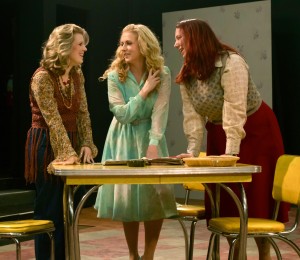Being a man of high culture, I jumped at the opportunity to attend two college theater productions over the last two weekends. I would be understating the fact by saying that they were both very different on a lot of levels.
San Diego State University Theater Department’s production of “Crimes of the Heart” written by Beth Henley and directed by Carolyn Keith is a flash back to a early 1970s Mississippi that chooses to continue ignoring the country around them, trying make an effort to become more tolerant racially as they stayed rooted in their southern traditions of intolerance.
The story revolves around three sisters who come together at their home in Hazlehurst, Mississippi in support of the youngest of the siblings who has been charged with the attempted murder of her abusive husband.
Monique Hanson as Lenny, the oldest sister and Jessica Christman as Meg, the middle sister both turn in captivating and completely believable performances as fussy sisters but it was Allie Boettcher as the youngest sister Babe who outshined even the brightest of stage lights. Her actions away from the center of attention and her comedic timing guarantee a fast rise to the top of the theater world in the near future.
Ryan Sandvick’s “Ah shucks” Doc Porter, Anna Krieg’s pushy and prissy Cousin Chick, and the scene-stealing Shane Allen as Barnette Lloyd, Babe’s lawyer, completes a very talented cast.
Well directed and performed on a highly detailed set in SDSU’s Experimental Theater, complete with a working sink on stage, the play shows the level of professionalism put into this production of a dark comedy about some very “dark” issues.
The second play, Mesa College Theatre Company’s presentation of Moliere’s “Scapin” also known as “Les Fourberies de Scapin”, a French comedy from the 1600s, never really quite got out of the starting gate on opening night.
This version of the play, adapted by Bill Irwin and Mark O’Donnell, is plagued with clunky dialogue, overacting of what is supposed to be overacting, and modern reference jokes that were only funny to the parents who were in attendance and 18 year-old theater girls who giggled continuously through the show in the front row.
Scapin, played by Bobby Atkins, lies and tricks, shucks and jives through a confusing series of circumstances in order to help two young men stay married to women their fathers are not aware of.
Nate Adams as Octave bounces all over the stage with the nervousness of someone who is spending his time backstage mainlining energy drinks. The second son Leander, is played by Ryan Luster with the flamboyance of a character from the movie “The Birdcage,” prancing around the stage as if he was in a totally different play.
The two bright spots came from Bryan Cajamarca as Sylvestre who did embody the role of comic relief brilliantly and Brennon Walker as George was a pleasure to watch in full Paul Shaffer mode from his perch downstage right. Walker also entertained the crowd as they found their way to their seats before the show with classic rock covers played from an electric guitar while puffing on an electronic cigarette.
Jeremy White and Carlos Angel-Barajas play the boisterous fathers Geronte and Argante. Mistianna Stromatt and Paloma Dominguez play the newlywed wives of the sons Hyacinth and Zerbintte. Kate Schwebel plays the wet nurse Nerine who is upstaged by her own backside (you just had to be there).
This version of the play was written by a couple of vaudevillian guys so I understand what was trying to be achieved with the back-and-forth dialogue between the actors down to the Benny Hill-like chase sequence that closed the show. But the fact of the matter remains: I will never get those two hours back.
Over the course of writing this article, I have spoken to different people who have reminded me that these two plays cannot be graded on an even playing field because one school is better funded and has a deeper talent pool to pull from. However, talent always trumps production value, which is something that should be learned better sooner than later.

